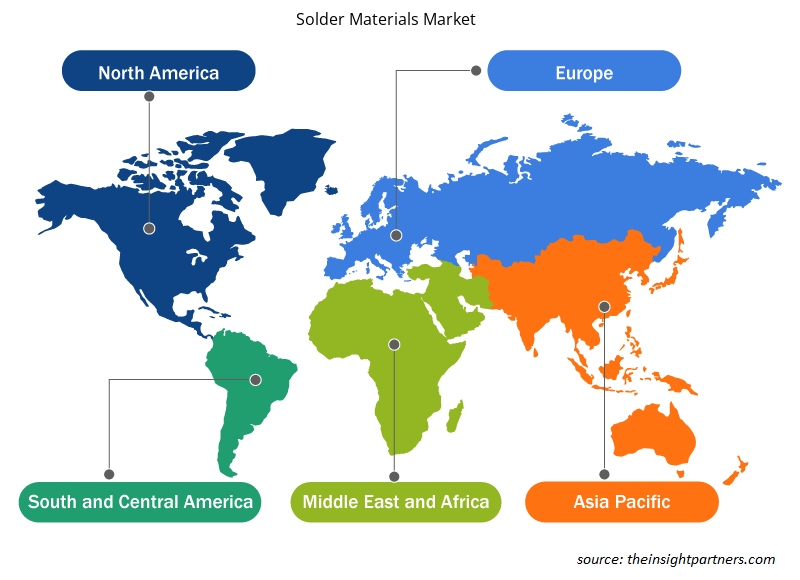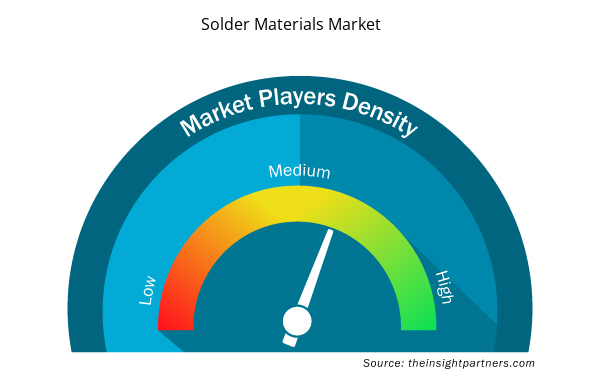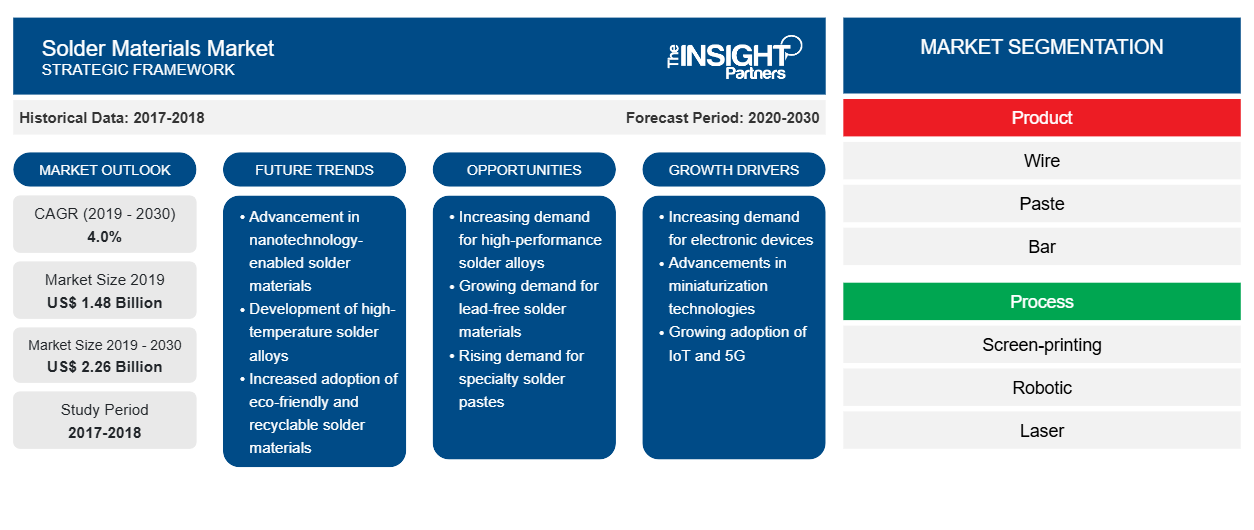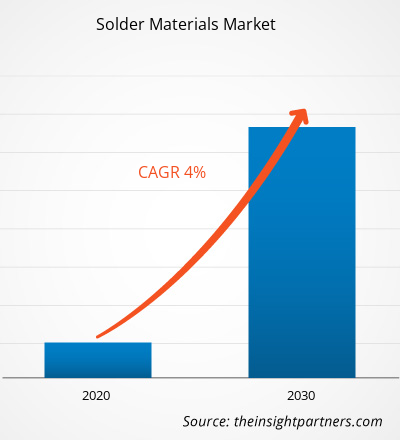2019 年焊料材料市场价值为 14.772 亿美元,预计 2020 年至 2030 年的复合年增长率为 4.0%,到 2030 年达到 22.553 亿美元。
焊接是一种将两种或两种以上金属熔化连接在一起,然后将填充金属(称为焊料)放入接头中的工艺。该工艺中使用的填充金属的熔点低于相邻金属。在过去的几十年里,几乎所有焊料都含有铅;然而,消费者对环境和健康的担忧越来越多地要求在电子和管道领域使用无铅合金。焊料用于电子、管道、建筑和金属制品,包括珠宝、医疗和乐器的闪光。焊料主要在管道系统中的铜管之间提供相当永久但可逆的连接,以及在金属片物体(如食品罐、雨水槽、屋顶防水板和汽车散热器)之间的接头。电子焊料将电线连接到设备,将电子元件连接到印刷电路板。
预计 2020 年至 2030 年期间,亚太地区的全球焊料材料市场将以 4.2% 的最高复合年增长率增长。该地区对焊料材料的高需求以及消费者向智能电子产品的转变为焊料材料市场创造了强大的基础。凭借如此可观的增长,亚太地区将成为预测期内焊料材料市场最具吸引力的地区。
2019 年 12 月始于中国武汉的 COVID-19 疫情已迅速蔓延至全球。截至 2020 年 6 月,美国、俄罗斯、印度、中国、意大利、西班牙、法国和德国是确诊病例和死亡人数最多的国家。根据世界卫生组织 2020 年 6 月更新的数据,全球已报告确诊病例约 7,482,952 例,死亡人数约 419,497 例。由于封锁、旅行禁令和企业停业,疫情已影响到经济和行业。化学品和材料是全球主要行业之一,受此次疫情影响,供应链中断、技术活动取消和办公室关闭等情况严重。中国是全球制造业中心,也是各行业最大的原材料供应国;然而,它也是受 COVID-19 疫情影响最严重的国家之一。中国各大工厂的停工影响了全球供应链,并对各种化学品和材料的制造和销售产生了不利影响。由于工厂关闭、供应链受阻以及世界经济低迷,COVID-19 导致的整体市场崩溃也影响了焊料材料市场的增长。
定制此报告以满足您的需求
您可以免费定制任何报告,包括本报告的部分内容、国家级分析、Excel 数据包,以及为初创企业和大学提供优惠和折扣
- 获取此报告的关键市场趋势。这个免费样品将包括数据分析,从市场趋势到估计和预测。
市场洞察
电子行业需求增长有利于全球焊料材料市场增长
对各种智能电子产品的需求不断增长以及节能电子产品的出现是推动焊料材料市场增长的主要因素。此外,发展中国家电子设备或小工具产量的不断增长,加上电子售后市场行业的显著发展,预计将推动对焊料材料的需求。焊膏中的传统微米焊料材料存在几个缺点,例如熔化温度高,这会导致回流处理过程中产生不必要的应力、应用受限以及接头缺陷。这进一步导致了创新的亚微米和纳米颗粒焊料材料的引入。因此,电子翻新领域的这些进步可能会推动全球焊料材料市场的增长。电子行业使用各种类型的焊料材料,例如无铅焊料、焊锡丝、焊锡球和焊锡条。由于监管要求以及避免使用含铅电子元件对健康和环境的益处,无铅焊料在几乎所有应用中的使用越来越广泛。它们主要用于消费电子产品。对于电气和电子工作,焊锡丝具有多种厚度,可用于手工焊接,并且焊锡丝的芯含有助焊剂。
产品洞察
根据产品,焊料材料市场细分为焊丝、焊膏、焊条、助焊剂等。焊丝部分在 2019 年占全球市场的最大份额;而焊膏市场预计在预测期内将以最高复合年增长率增长。焊锡丝由不同类型的合金或纯锡组成。由于组成焊锡丝的金属组合在不同温度下熔化,因此每种金属都需要某种类型的焊锡丝来形成牢固的结合。焊锡丝中最常用的金属是铅 (Pb) 和锡 (Sn)。软焊料的熔点范围基本上为 190−900°F。无铅焊料越来越多地用于满足监管要求以及避免使用含铅电子元件的健康和环境效益。它们主要用于消费电子产品。
流程洞察
根据工艺,焊料市场细分为丝网印刷、机器人、激光和波峰/回流焊。2019 年,波峰/回流焊部分占全球焊料市场的最大份额;而机器人部分预计在预测期内将实现最高的复合年增长率。波峰焊是一种大规模焊接工艺,通过该工艺,电子元件主要焊接到印刷电路板 (PCB) 上以形成电子组件。该名称的基本来源是使用熔融焊料波将金属元件连接到 PCB 上。该工艺利用一个槽来容纳一定量的熔融焊料,将元件插入 PCB,然后将装载的 PCB 通过泵送的焊料波或瀑布。回流焊是一种工艺,其中使用焊膏将一个或多个微小的电子元件暂时连接到其接触垫上;之后,整个组件将受到受控的热量。焊膏在熔融状态下回流可以形成永久的焊点。在此过程中,加热是通过将组件放入回流炉或红外线灯,或通过使用除焊热风笔焊接各个接头来实现的。
焊料材料市场区域洞察
Insight Partners 的分析师已详尽解释了预测期内影响焊料材料市场的区域趋势和因素。本节还讨论了北美、欧洲、亚太地区、中东和非洲以及南美和中美洲的焊料材料市场细分和地理位置。

- 获取焊料材料市场的区域特定数据
焊料材料市场报告范围
| 报告属性 | 细节 |
|---|---|
| 2019 年市场规模 | 14.8亿美元 |
| 2030 年的市场规模 | 22.6亿美元 |
| 全球复合年增长率(2019 - 2030 年) | 4.0% |
| 史料 | 2017-2018 |
| 预测期 | 2020-2030 |
| 涵盖的领域 | 按产品
|
| 覆盖地区和国家 | 北美
|
| 市场领导者和主要公司简介 |
|
市场参与者密度:了解其对商业动态的影响
焊料材料市场正在快速增长,这得益于终端用户需求的不断增长,而这些需求又源于消费者偏好的不断变化、技术进步以及对产品优势的认识不断提高等因素。随着需求的增加,企业正在扩大其产品范围,进行创新以满足消费者的需求,并利用新兴趋势,从而进一步推动市场增长。
市场参与者密度是指在特定市场或行业内运营的企业或公司的分布情况。它表明在给定市场空间中,相对于其规模或总市场价值,有多少竞争对手(市场参与者)存在。
在焊料材料市场运营的主要公司有:
- 融合公司
- 铟公司
- 凯斯特
- 光机株式会社
- 卢卡斯-米尔豪普特公司
免责声明:上面列出的公司没有按照任何特定顺序排列。

- 了解焊料材料市场主要参与者概况
报告亮点
- 全球焊料材料市场的渐进式行业趋势有助于参与者制定有效的长期战略
- 发达市场和发展中市场采用的业务增长战略
- 2017年至2030年全球焊锡材料市场定量分析
- 各终端行业对全球焊料材料需求的估计
- PEST 分析可说明行业内买家和供应商预测市场增长的有效性
- 了解竞争激烈的市场形势和全球焊料材料需求的最新发展
- 市场趋势和展望,以及推动和抑制全球焊料材料市场增长的因素
- 了解全球焊料材料市场增长的商业利益战略,从而促进有效的决策过程
- 全球焊锡材料市场各市场节点规模
- 全球焊料材料市场的详细概述和细分,以及行业动态
- 全球焊锡材料市场各地区规模及各自市场的增长机会
焊接材料市场(按产品划分)
- 金属丝
- 粘贴
- 酒吧
- 通量
- 其他的
焊接材料市场(按工艺分类)
- 波峰焊/回流焊
- 机器人
- 丝网印刷
- 激光
公司简介
- 融合公司
- 铟公司
- 凯斯特
- 光机株式会社
- 卢卡斯-米尔豪普特公司
- Qualitek International, Inc.
- 千住金属工业株式会社
- Stannol GmbH & Co. KG
- 田村制作所
- 日本玄魔
- 历史分析(2 年)、基准年、预测(7 年)及复合年增长率
- PEST 和 SWOT 分析
- 市场规模价值/数量 - 全球、区域、国家
- 行业和竞争格局
- Excel 数据集



Report Coverage
Revenue forecast, Company Analysis, Industry landscape, Growth factors, and Trends

Segment Covered
This text is related
to segments covered.

Regional Scope
North America, Europe, Asia Pacific, Middle East & Africa, South & Central America

Country Scope
This text is related
to country scope.
常见问题
Major market share of wiresegment is primarily attributed to the fact that for electrical & electronics work, solder wire is available in the market with a range of thicknesses for hand-solder and with cores containing flux. It is further available as a room temperature paste. Jewelers often utilize solder in thin sheets, which they cut into snippets. A soldered joint is basically used to attach a wire to the pin of a component on the rear of a printed circuit board. Solder wire is comprised of different types of alloys, or of pure tin. Each metal requires a certain type of solder wire to create strong bonds, since the combinations of metals that comprise solder wire melt at different temperatures. Lead-free solders are increasing in use owing to regulatory requirements along with the health & environmental benefits towards avoiding lead-based electronic components. They are mostly used in consumer electronics. Steel wire, screwdrivers, nails, and Alan wrenches are all potential tools for emergency solder.
The major players operating in the globalsolder materialsmarketareFusion Incorporated, Indium Corporation, Kester, KOKI Company Ltd, Lucas-Milhaupt, Inc., Qualitek International, Inc., Senju Metal Industry Co., Ltd, Stannol GmbH & Co. KG, Tamura Corporation, and Nihon Genmaamong many others.
In 2019,the solder materialsmarket was predominantin Asia-Pacificat theglobal level.The APAC encompasses huge opportunities for the growth of soldermaterials. The region has surfaced as one of the prominent markets for the utilization of soldermaterials. Asia has ranked highest amongst electronics producing regions. Japan is dominating the regional market, followed by other countries such as China, India, Vietnam, Korea, Thailand, Malaysia, and Indonesia. These countries are witnessing growing demand from the electronic and automobiles industries. Apart from its applications in the electronic industry, the solder materials market has been propelling due to its applications in electronic vehicles. The price for petrol, diesel, and CNG, has increased subsequently that has created opportunities for the electric, coupled with a shift in consumer living standards. This shift has fueled the growth of the market in the region. Moreover, expanding disposable income and increasing purchasing capabilities are predicted to impact market growth positively.
Trends and growth analysis reports related to Chemicals and Materials : READ MORE..
The List of Companies - Global Solder Materials Market
- Fusion Incorporated
- Indium Corporation
- Kester
- KOKI Company Ltd
- Lucas-Milhaupt, Inc.
- Qualitek International, Inc.
- Senju Metal Industry Co., Ltd.
- Stannol GmbH & Co. KG
- TAMURA Corporation
- Nihon Genma
The Insight Partners performs research in 4 major stages: Data Collection & Secondary Research, Primary Research, Data Analysis and Data Triangulation & Final Review.
- Data Collection and Secondary Research:
As a market research and consulting firm operating from a decade, we have published and advised several client across the globe. First step for any study will start with an assessment of currently available data and insights from existing reports. Further, historical and current market information is collected from Investor Presentations, Annual Reports, SEC Filings, etc., and other information related to company’s performance and market positioning are gathered from Paid Databases (Factiva, Hoovers, and Reuters) and various other publications available in public domain.
Several associations trade associates, technical forums, institutes, societies and organization are accessed to gain technical as well as market related insights through their publications such as research papers, blogs and press releases related to the studies are referred to get cues about the market. Further, white papers, journals, magazines, and other news articles published in last 3 years are scrutinized and analyzed to understand the current market trends.
- Primary Research:
The primarily interview analysis comprise of data obtained from industry participants interview and answers to survey questions gathered by in-house primary team.
For primary research, interviews are conducted with industry experts/CEOs/Marketing Managers/VPs/Subject Matter Experts from both demand and supply side to get a 360-degree view of the market. The primary team conducts several interviews based on the complexity of the markets to understand the various market trends and dynamics which makes research more credible and precise.
A typical research interview fulfils the following functions:
- Provides first-hand information on the market size, market trends, growth trends, competitive landscape, and outlook
- Validates and strengthens in-house secondary research findings
- Develops the analysis team’s expertise and market understanding
Primary research involves email interactions and telephone interviews for each market, category, segment, and sub-segment across geographies. The participants who typically take part in such a process include, but are not limited to:
- Industry participants: VPs, business development managers, market intelligence managers and national sales managers
- Outside experts: Valuation experts, research analysts and key opinion leaders specializing in the electronics and semiconductor industry.
Below is the breakup of our primary respondents by company, designation, and region:

Once we receive the confirmation from primary research sources or primary respondents, we finalize the base year market estimation and forecast the data as per the macroeconomic and microeconomic factors assessed during data collection.
- Data Analysis:
Once data is validated through both secondary as well as primary respondents, we finalize the market estimations by hypothesis formulation and factor analysis at regional and country level.
- Macro-Economic Factor Analysis:
We analyse macroeconomic indicators such the gross domestic product (GDP), increase in the demand for goods and services across industries, technological advancement, regional economic growth, governmental policies, the influence of COVID-19, PEST analysis, and other aspects. This analysis aids in setting benchmarks for various nations/regions and approximating market splits. Additionally, the general trend of the aforementioned components aid in determining the market's development possibilities.
- Country Level Data:
Various factors that are especially aligned to the country are taken into account to determine the market size for a certain area and country, including the presence of vendors, such as headquarters and offices, the country's GDP, demand patterns, and industry growth. To comprehend the market dynamics for the nation, a number of growth variables, inhibitors, application areas, and current market trends are researched. The aforementioned elements aid in determining the country's overall market's growth potential.
- Company Profile:
The “Table of Contents” is formulated by listing and analyzing more than 25 - 30 companies operating in the market ecosystem across geographies. However, we profile only 10 companies as a standard practice in our syndicate reports. These 10 companies comprise leading, emerging, and regional players. Nonetheless, our analysis is not restricted to the 10 listed companies, we also analyze other companies present in the market to develop a holistic view and understand the prevailing trends. The “Company Profiles” section in the report covers key facts, business description, products & services, financial information, SWOT analysis, and key developments. The financial information presented is extracted from the annual reports and official documents of the publicly listed companies. Upon collecting the information for the sections of respective companies, we verify them via various primary sources and then compile the data in respective company profiles. The company level information helps us in deriving the base number as well as in forecasting the market size.
- Developing Base Number:
Aggregation of sales statistics (2020-2022) and macro-economic factor, and other secondary and primary research insights are utilized to arrive at base number and related market shares for 2022. The data gaps are identified in this step and relevant market data is analyzed, collected from paid primary interviews or databases. On finalizing the base year market size, forecasts are developed on the basis of macro-economic, industry and market growth factors and company level analysis.
- Data Triangulation and Final Review:
The market findings and base year market size calculations are validated from supply as well as demand side. Demand side validations are based on macro-economic factor analysis and benchmarks for respective regions and countries. In case of supply side validations, revenues of major companies are estimated (in case not available) based on industry benchmark, approximate number of employees, product portfolio, and primary interviews revenues are gathered. Further revenue from target product/service segment is assessed to avoid overshooting of market statistics. In case of heavy deviations between supply and demand side values, all thes steps are repeated to achieve synchronization.
We follow an iterative model, wherein we share our research findings with Subject Matter Experts (SME’s) and Key Opinion Leaders (KOLs) until consensus view of the market is not formulated – this model negates any drastic deviation in the opinions of experts. Only validated and universally acceptable research findings are quoted in our reports.
We have important check points that we use to validate our research findings – which we call – data triangulation, where we validate the information, we generate from secondary sources with primary interviews and then we re-validate with our internal data bases and Subject matter experts. This comprehensive model enables us to deliver high quality, reliable data in shortest possible time.


 获取此报告的免费样本
获取此报告的免费样本